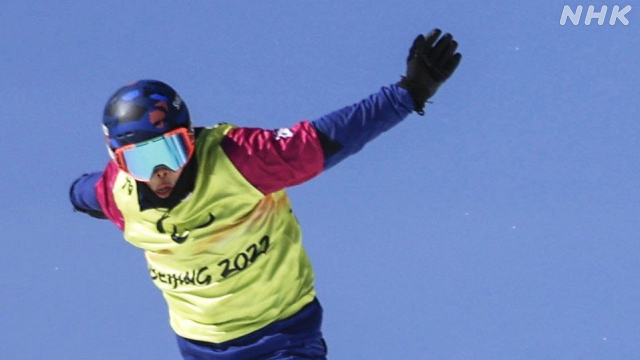Snowboarding The challenge of “fairness” that emerged Paralympics March 14, 16:15
The Beijing Paralympics and Snowboarding were the second competition for the Paralympics alone.
Six boys from Japan will participate.
As a team, I worked hard to improve my skills, but I didn't win any medals.
At the snowboard cross, four people will slide together from this tournament, and while the race was more exciting, the issue of how to make the difference in the degree of disability fair was also raised.
(Sports News Department Reporter Toshiya Mochii)
Japan challenged as a team
Director Kenichi Niboshi, who has led the six men who participated in snowboarding, recalled that Japan challenged the tournament as a team this time.
"Four years ago, it was an individual individual, but now it is a team that has cohesiveness as a team."
Parasnowboarding became an independent competition, and the first time it was held was the last Pyeongchang tournament, where Japan won gold and bronze medals. did.
After that tournament, the six representatives of this tournament were selected as strengthening designated players.
<Class with a disability in the arm (UL)>
Masataka Oiwane (41)
<Class with a severe disability in the foot (LL1)>
Daichi Oguri (41)
Junta Kosuda (31)
<Class with a disability in the foot (LL2) >
Takahito Ichikawa (30)
Keiji Okamoto (40)
Shinji Tabuchi (40)
The average age of six people with different degrees of disability and individuality is 37 years.
The six people, who spent a lot of time together on overseas expeditions, all aimed for the Paralympics.
And when all the players were decided to participate, the players said, "I'm glad we were able to go with these six people."
Possibility for 4 years
The Beijing Paralympics have arrived.
The players were uplifted by the pre-match circle.
The first event is snowboard cross.
In the quarter-finals, Okamoto and Tabuchi were in the same group, and Tabuchi was planning a strategy to suppress other players so that Okamoto could take the lead.
It was a race with the team's thoughts, "Even one person will be on the podium."
However, in this event, Oguri and Ichikawa were the best in 5th place, and even in the next Banked Slalom, they did not reach the medal they were aiming for.
After the race, what the players said was their feelings for their friends.
"I'm very happy to be a member of the best team in the world."
The spirit of this team, which has evolved by thinking about what can be done to develop each other's strengths, is the spirit of Japanese parasnowboarding for four years from now. It has the potential to evolve further.
China's breakthrough “Many times on the same course as the production”
The host country, China, has made great strides in this tournament.
The number of participants was 18 for both men and women, which was the largest number, and 10 medals including 3 gold medals were won.
Especially in the class where the men's snowboard cross has a disability, the Chinese dominated the podium.
Kiritsuya, who participated in the second event and won the gold and silver medals, revealed that he had the advantage of holding the event locally after practicing many times on the same course as the actual one.
Ji Lijia (China)
"We have been preparing for many years. We all studied and trained with reference to overseas players."
How to maintain "fairness"
However, issues have emerged regarding the “fairness” of parasnowboarding.
In paralympic alpine skiing and cross-country skiing, fairness is maintained by multiplying the actual time by a coefficient according to the degree of disability.
On the other hand, in a snowboarding class with a disability, a player with no shoulders and a player with no wrists will slip in the same class under the same conditions.
This makes a difference when pulling the start bar and balancing while gliding.
In addition, the number of athletes who participated in this tournament was small, so "fairness" was highlighted.
Only one class with a disability in the leg was held at this tournament, and there was no class with a disability in the arm and no class with a severe disability in the leg.
The reason was that there were few players to participate.
Brenna Huckaby of the United States won the gold medal in the second event in the previous tournament where she participated in a class with severe foot disabilities.
However, in this tournament, I will compete with players who have less disabilities than I do in the class with disabilities.
"There is a big disadvantage of amputation above the knee, but the choice not to compete in the race is more damaging to me."
As a result, Hackerby won the bronze medal at the snowboard cross and the gold medal at the reversal in the banked slalom for the second time, but he needed an environment where he could play more fairly after the race. I complained.
Brenna Huckabee
"I think it's a great honor to be able to race with the best players here, but once this is over I want to return to a class with heavy disabilities and this tournament has made a big difference. I hope that para-snowboarding will spread. "
Para snowboarding became an independent competition and became the second competition.
I felt that it was necessary to seriously tackle the issue of "fairness" that emerged at this tournament in order to evolve into something more attractive in the next four years.

